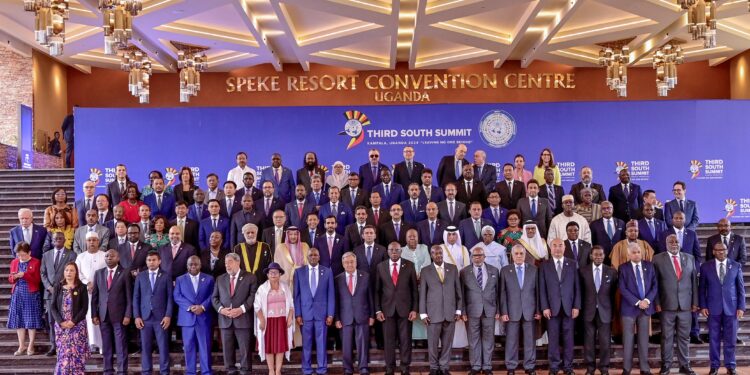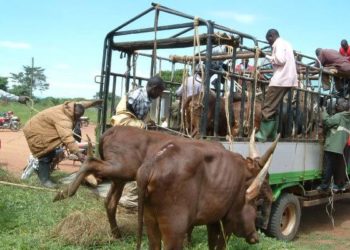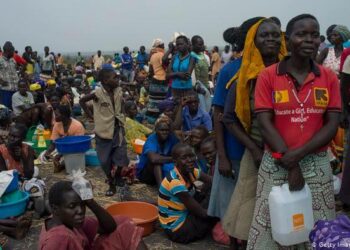China is mobilizing the Group of 77 developing nations, urging them to advocate for a reform of the global governance system that, according to leaders in Africa, Asia, and Latin America, is perceived to disproportionately favor the West.
During the third South Summit in Kampala, Uganda, Chinese Vice-Premier Liu Guozhong asserted that developing nations “should collectively endorse the restructuring of the World Trade Organisation (WTO) and the international financial system.”
Liu, speaking as a special representative of Chinese President Xi Jinping, addressed the 134-country G77 and China, a group in which China does not officially claim membership but actively engages. Uganda assumed the chairmanship from Cuba during this pivotal meeting.
China aligns itself with a growing coalition, particularly from Africa and Asia, advocating for a profound reorganization of the global political and economic framework.
Key targets include the UN Security Council, the WTO, the World Bank, and the IMF. Concerns about the relevance of the Bretton Woods institutions, namely the IMF and the World Bank, have intensified due to perceived inadequacies in their structure, location, and mandate to address evolving global dynamics.
The significant role of the United States in establishing and maintaining influence over the IMF and World Bank, both headquartered in Washington DC, is a focal point in discussions surrounding the need for reform.
This burgeoning movement for change underscores a collective call for adapting international institutions to better cope with contemporary global shifts.
Liu’s push for WTO reform aligns with Chinese President Xi Jinping’s recent call for enhanced efforts in restructuring the organization. Since China’s accession in 2003, the WTO has evolved into the world’s largest goods trader, fostering partnerships with over 140 countries.
Present at the summit as Xi’s special representative, Liu emphasized the critical need to enhance the efficiency of international development agencies in aiding Global South countries, encompassing Latin America, Asia, Africa, and Oceania.
He underscored the unstoppable ascent of Global South nations, while lamenting the persistent effects of an unjust past international political and economic order.
As part of China’s global financial system reform initiative, Beijing played a pivotal role in establishing institutions like the New Development Bank, Asia Infrastructure Investment Bank, and Silk Road Fund.
These entities offer alternative lending solutions for nations unable to access international financial markets, channeling multibillion-dollar funding into projects across Asia and other overseas regions.
Liu urged developing countries, particularly those in the Global South, to amplify their representation and voices to address longstanding issues in international governance.
Simultaneously, he called upon developed nations to fulfill their commitments in development and climate financing, urging accelerated progress on the 2030 Sustainable Development Goals (SDG) agenda.
Expressing China’s commitment to common development, Liu highlighted investments through initiatives like the Belt and Road Initiative and the Global Development Initiative. With over 3,000 Belt and Road projects valued at more than US$1 trillion in the past decade, China’s extensive financial support has reverberated globally.
Referencing President Xi’s stance, Liu conveyed that China, considering itself a developing country aligned with the Global South, steadfastly stood by fellow developing nations in times of adversity.
This commitment was underscored by Xi’s assertion that China, despite its superpower status, remained dedicated to the development and well-being of the Global South.
Highlighting the continued importance of South-South cooperation, Liu garnered support from attending leaders, including UN Secretary-General Antonio Guterres, who, at Liu’s prompting, expressed intent to nominate a special envoy for poverty eradication.
Guterres, addressing the assembly, criticized the outdated international system, deeming it reflective of a bygone era when many nations were colonized. He called for the imperative reform of the paralyzed UN Security Council, emphasizing the mismatch between its current composition and the realities of today’s world.
Furthermore, Guterres underscored the failure of the global financial system, including Bretton Woods institutions, to provide an effective safety net for distressed developing countries. Anticipating significant reforms, he pointed to the upcoming Summit of the Future in New York in September.
Dennis Francis, UN General Assembly President, urged urgent reforms across multilateral organizations, emphasizing the need for an inclusive and equitable international financial system.
Rooted in inclusion and equity, he advocated for a system inspiring commitment to multilateralism, aligning with Sustainable Development Goals (SDGs) and breaking detrimental cycles of debt and interest for developing nations.
As the newly appointed chairman of the G77 and China, Ugandan President Yoweri Museveni rallied leaders to maintain a united front in demanding international support for developing countries facing urgent global challenges.
President Museveni emphasized the group’s commitment to realizing an international economic order that aligns with the just and equitable vision conceived 59 years ago at its inception. He stressed Uganda’s support for urgent reforms in the international financial architecture, ensuring it effectively meets the financing needs of developing nations.
Seifudein Adem, an Ethiopian global affairs professor, drew parallels between the G77 and China and the Non-Aligned Movement (NAM) in representing the interests of developing countries.
While acknowledging China’s evolution into a superpower, Adem noted that observers see alignment or intersection of China’s interests with those of the G77.
In contrast to NAM’s crisis post-Cold War, Adem emphasized the continued validity of the G77’s raison d’être, grounded in enduring international political and economic conditions that led to its formation.
Since its establishment in 1964, the G77, initially comprising 77 developing nations, has championed economic cooperation. Beijing has consistently provided political and financial backing to the group since 1994.
Do you have a story in your community or an opinion to share with us: Email us at editorial@watchdoguganda.com













